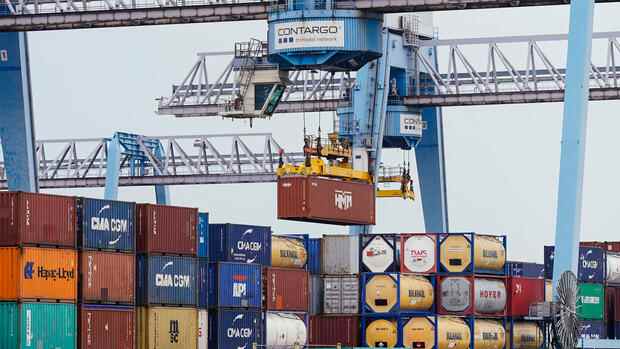German companies raised the prices for their export goods by 14.7 percent in the first half of the year.
(Photo: dpa)
Berlin Sentiment among German exporters clouded over for the third month in a row in August in view of the global economic slowdown. The barometer for export expectations fell to minus 2.7 points from minus 0.4 points in July, as the Munich Ifo Institute announced on Friday in its survey of 2,300 companies.
“The companies do not expect any dynamic development of their exports,” commented Ifo President Clemens Fuest on the development. “High gas prices and a weak global economic environment are having a negative impact on the outlook.” Recently, the US and Chinese economies, the two most important customer countries for goods “Made in Germany”, have shrunk.
According to the survey, a majority of sectors expect their exports to fall. The chemical industry, for example, had to cope with a significant setback: Expectations here fell to their lowest level since April 2020, when the incipient corona pandemic hit business. Printers even hit a record low.
But there are also positive exceptions. “Significant increases in exports are expected by the vehicle manufacturers and their suppliers,” it said. The clothing industry and the manufacturers of data processing equipment, electronic and optical products also expected increasing foreign sales.
Top jobs of the day
Find the best jobs now and
be notified by email.
The meager demand is not the only problem for the exporters: According to the DIHK, they are left with billions in costs due to the sharp rise in import and producer prices, which they cannot fully pass on to their foreign customers. “The resulting burden on German foreign trade amounts to 70 billion euros for the first six months alone,” Volker Treier, head of foreign trade at the Association of German Chambers of Industry and Commerce (DIHK), told the Reuters news agency.
Accordingly, German companies raised the prices for their export goods by 14.7 percent in the first half of the year. At the same time, however, both producer and import prices rose about twice as fast. “German foreign trade is in an extreme cost squeeze, from which it will not be able to free itself in the next few months,” said Treier.
More: Saving the German economy – What needs to be done to counteract the consequences of dependency, crises and war
